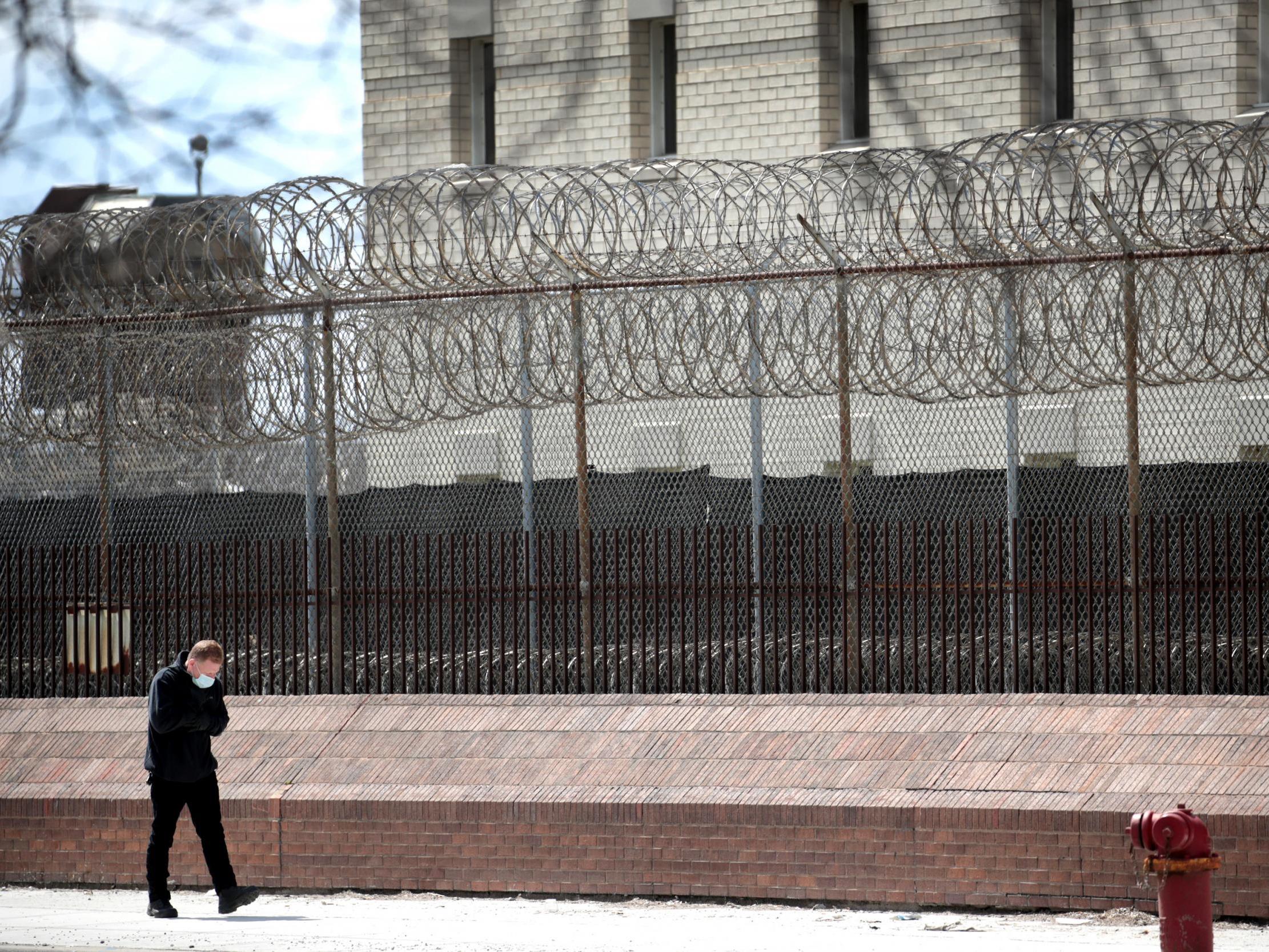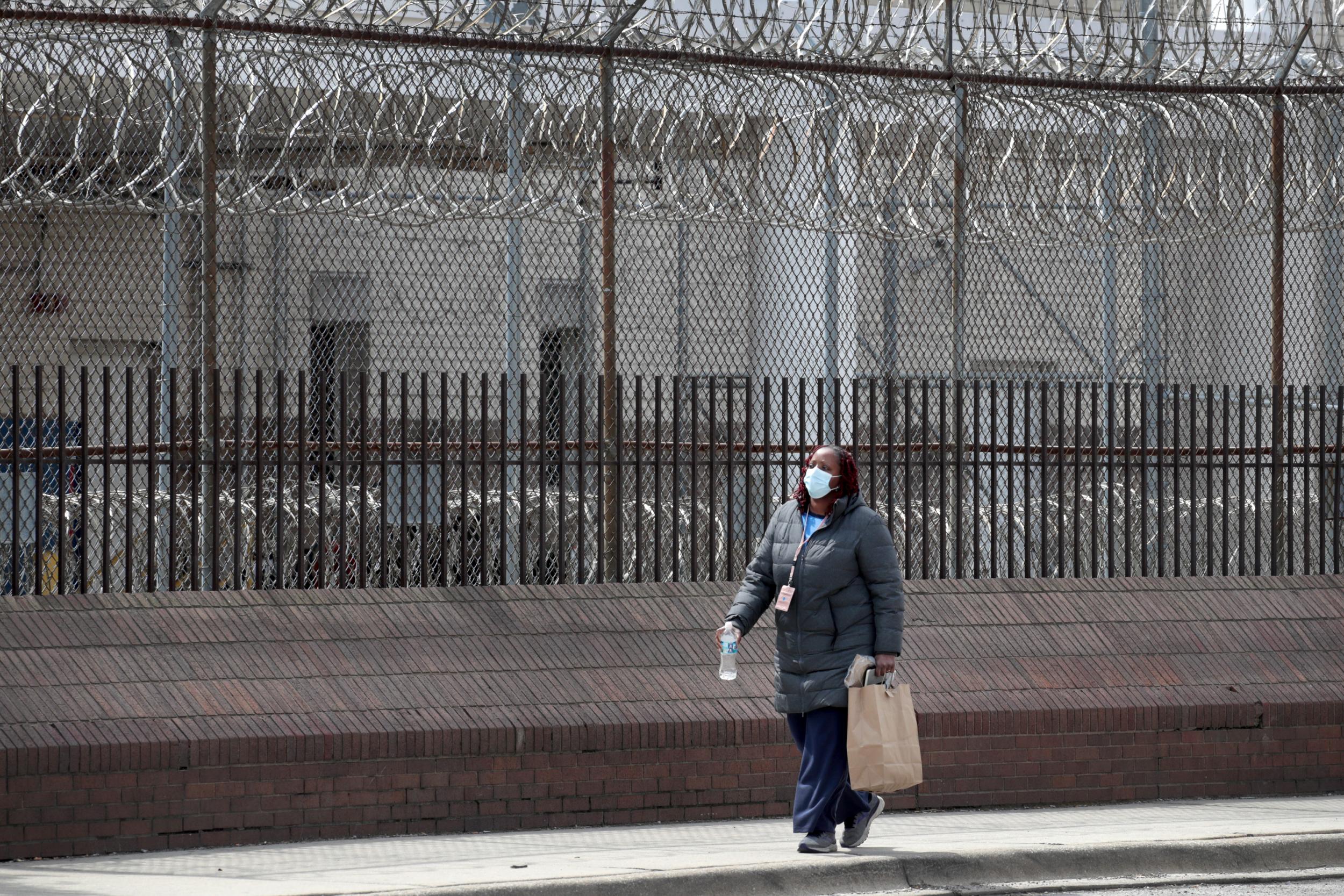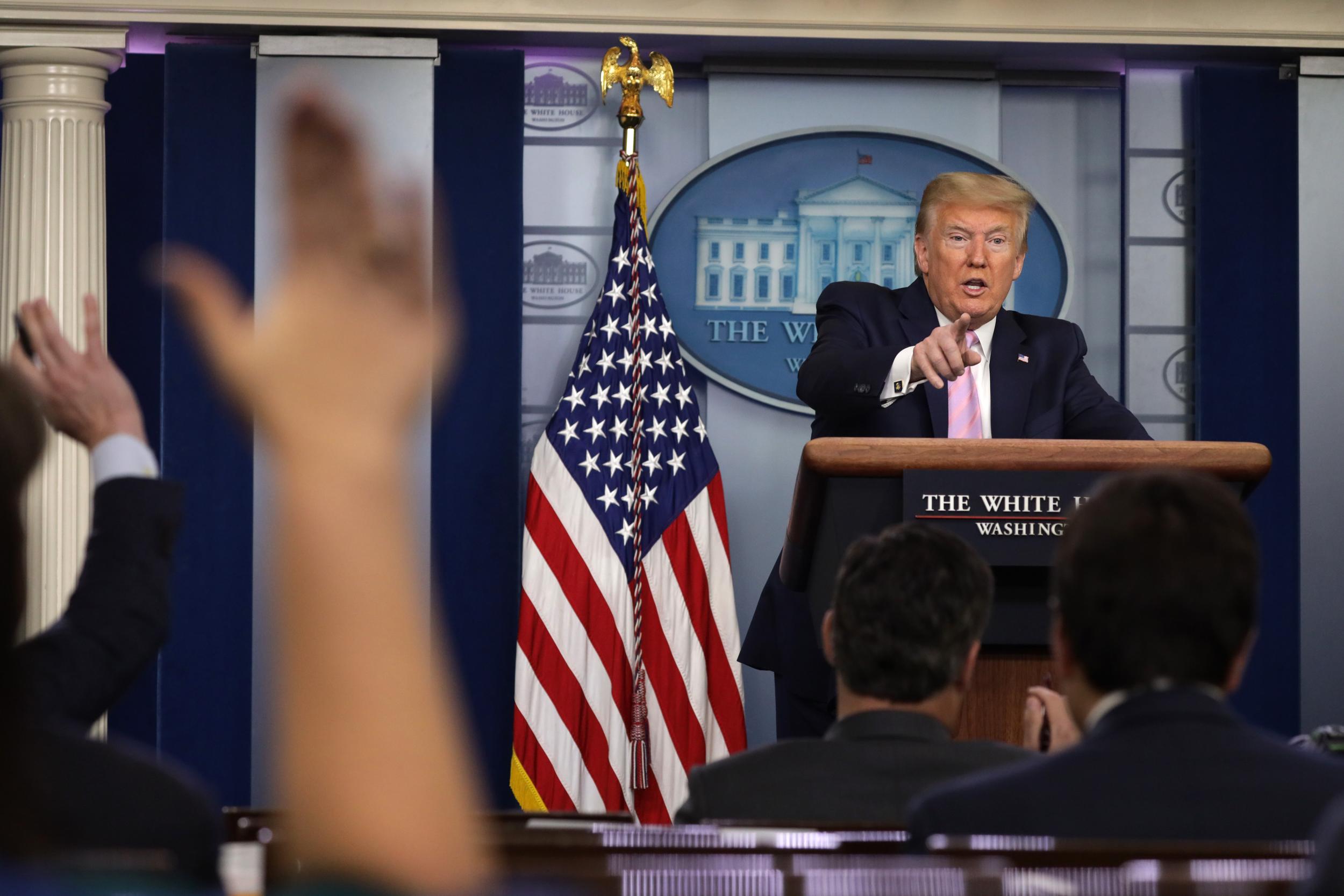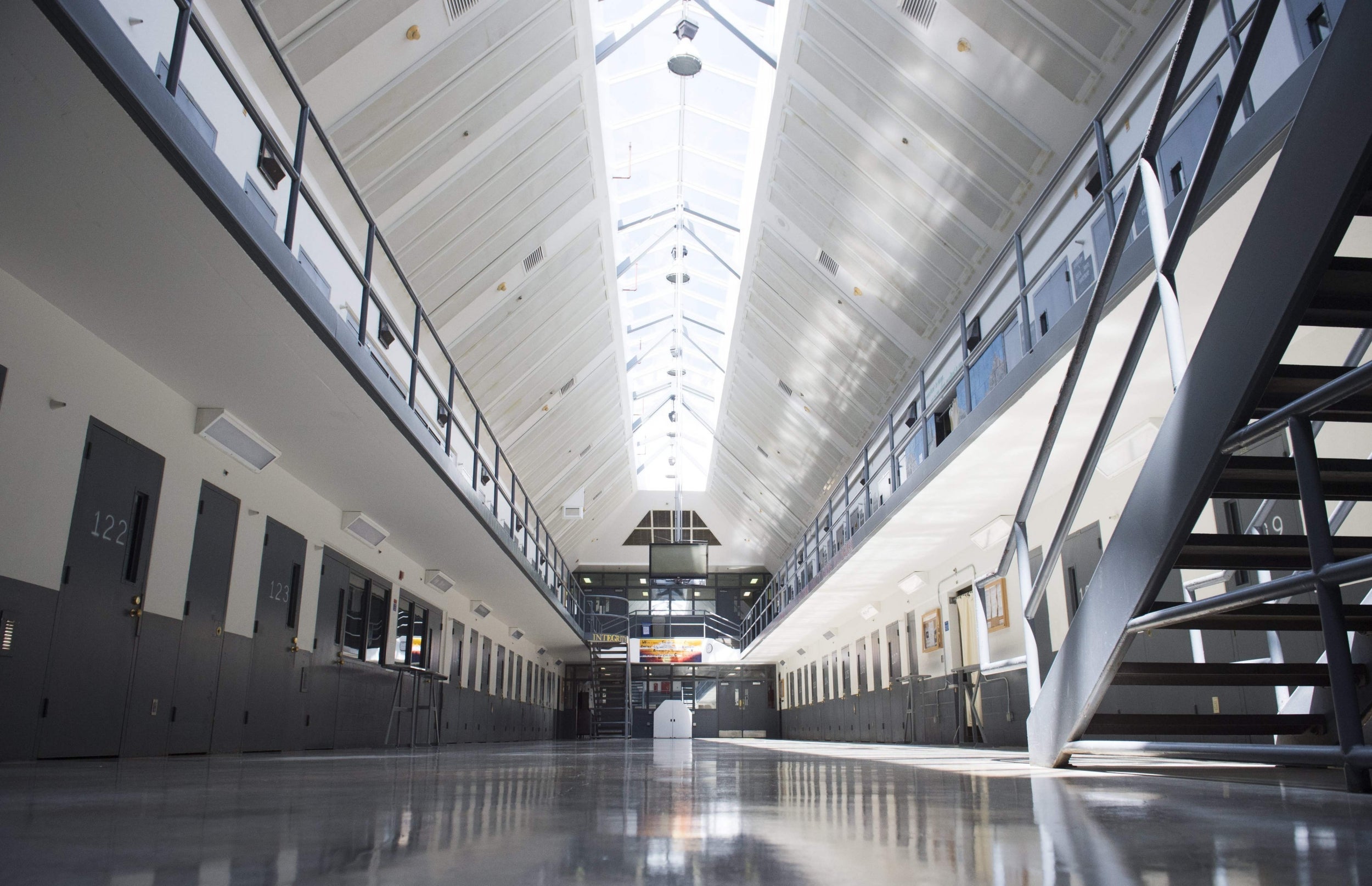Coronavirus: Inmates at Maryland prisons say social distancing is impossible due to shared facilities
The men share a bathroom area – toilets, sinks, showers – with another open room of about 30 inmates, report Dan Morse and Justin Jouvenal

Your support helps us to tell the story
From reproductive rights to climate change to Big Tech, The Independent is on the ground when the story is developing. Whether it's investigating the financials of Elon Musk's pro-Trump PAC or producing our latest documentary, 'The A Word', which shines a light on the American women fighting for reproductive rights, we know how important it is to parse out the facts from the messaging.
At such a critical moment in US history, we need reporters on the ground. Your donation allows us to keep sending journalists to speak to both sides of the story.
The Independent is trusted by Americans across the entire political spectrum. And unlike many other quality news outlets, we choose not to lock Americans out of our reporting and analysis with paywalls. We believe quality journalism should be available to everyone, paid for by those who can afford it.
Your support makes all the difference.Every morning, Diallo Shalto sees how flagrantly he violates Maryland’s social-distancing rules. And there’s nothing he can do about it.
Within several feet, he said, four other men sleep in bunks. Beyond them are another two dozen men on beds lined up inside an open room at Dorsey Run Correctional Facility – a minimum-security prison in Jessup where inmates serve the last 12 months of their sentences.
The men share a bathroom area – toilets, sinks, showers – with another open room of about 30 inmates, Shalto said. Over any given 24-hour period, he added, at least a half dozen different correctional officers walk through the two dorms, wearing masks over their face and coming and going every day in a state where more than 6,900 people have tested positive for coronavirus.
“It’s dangerous to have us housed like this,” Shalto said by phone recently from the 900-inmate, dorm-style facility. “Lots of us are coming up on our release dates. I think we should be released.”
Shalto’s concerns echo cries from advocates and defence attorneys across the country calling for the release of inmates amid the fast-moving coronavirus pandemic – focusing mostly on inmates who are elderly, immunocompromised, close to release, or associated with minor, nonviolent crimes.
This week, the American Civil Liberties Union (ACLU) of Maryland filed an emergency petition asking the state’s highest court to help speed the release of hundreds or thousands of inmates. The ACLU’s request came days before the state announced it was collaborating with the Army Corps of Engineers to construct medical tents at two prison facilities in Jessup and Hagerstown to treat inmates as needed.
“The surge is coming. It’s just an inevitability,” said Paul DeWolfe, Maryland’s chief public defender, who is seeking the release of inmates who are old, medically vulnerable or nearing their release terms. “Our jails and prisons are virtual petri dishes.”
As of Wednesday afternoon, Maryland’s Department of Public Safety and Correctional Services had 57 confirmed cases of Covid-19 within its system, including 10 inmates, 22 correctional officers and 19 contract workers.
Maryland Republican governor Larry Hogan has so far rebuffed calls for early release of inmates, with his office saying they have taken precautions to protect inmates.
“They’re safer where they are,” Mr Hogan said last month.

Maryland state prison officials said they are pushing for as much social distancing as they can. For weeks, inmates have gone without in-person visits. Inmates are being asked to stay in their cells longer while being released in smaller groups for exercise, recreation and meals.
“In the environment that we have, we’re doing everything in our power to keep people safe,” said Robert Green, secretary of the Maryland Department of Public Safety and Correctional Services. “We’re working to save Marylanders’ lives.”
Maryland inmates also have sewn 12,000 sneeze guard, protective masks, available to all correctional officers and soon to be received by all inmates. Inmates with confirmed or suspected Covid-19 are quarantined or isolated with surgical masks.
The crisis is playing out inside institutions where tensions can turn deadly.
“Give everyone the benefit of the doubt, and a wide berth,” Maryland prison officials recommended to their correctional officers in a recent operational update. “A lot of cooped up time can bring out the worst in everyone.”
Julie Magers, who is a petitioner on the Maryland ACLU action, said her husband, an inmate at Roxbury Correctional Institution, suffers from multiple sclerosis and heart disease and is blind.

“He is very scared,” Ms Magers said. “There’s no way for him to be proactive to stay safe. We’ve been hearing from a multitude of them: What can I do? I’m a sitting duck.”
Ms Magers said her husband has been given a single bar of soap to clean up in the last month. He has no way to sanitise his cell and no protective equipment like a mask, despite his compromised condition.
Prosecutors at the federal, state and local levels have considered releases in many cases but warn the coronavirus is not an invitation to release violent offenders who threaten public safety.
Baltimore County state’s attorney Scott Shellenberger said he has supported getting certain inmates released from the local jail – such as those older than 60 or coming in for weekends. But he has not supported release of anyone charged or convicted of violent crimes.
Regarding local jails, Mr Shellenberger said, “All state’s attorneys are willing to look at cases, but the place it has to stop is at violent offender.”
In places such as New York and California, authorities have released thousands of parole violators or nonviolent offenders nearing release. New Mexico is commuting some sentences.
The ACLU of DC and the Public Defender Service of DC sued the city’s Department of Corrections last month, claiming it did not take basic health measures to stop the spread of coronavirus. The DC jail on Wednesday reported its highest one-day increase in positive virus cases, adding nine more inmates to its tally of 37.
In Maryland federal court, more than 100 inmates have filed motions seeking release because of coronavirus. Fewer than 10 per cent have been granted
“Like cruise ships or naval vessels, it’s impossible to ‘distance’ oneself in jails,” James Wyda, Maryland’s top federal public defender, said in an email. “Once in, the virus will spread rapidly.”
Robert Hur, the Maryland US Attorney, said the low percentage of releases reflects the serious criminal charges against many of the inmates: “While the coronavirus represents a public health threat, violent offenders charged with serious crimes also pose a deadly threat to the health and wellbeing of our community.”

Within the Virginia Department of Corrections system 41 inmates, staff and contractors have tested positive for coronavirus. The ACLU in Virginia filed a lawsuit against state officials on behalf of 27 inmates alleging potential coronavirus exposure amounts to cruel and unusual punishment.
In addition to 18,000 inmates in state prisons, Maryland has thousands more in local jails.
“There’s no social distancing,” said Ahkilah Carter, an inmate at the Prince George’s County jail, speaking by phone. Mr Carter had violated his probation on a carjacking conviction, according to court records.
“We can’t do nothing. We’re locked up. Yeah we’re scared,” said Antonio Dean Ussery, who is also an inmate in Prince George’s, charged with attempted armed carjacking and weapons counts. “They are playing with people’s lives.”
Mr Ussery said inmates have watched with increasing alarm as inmates have shown symptoms of the virus. He said he played spades with an inmate who was removed from his housing unit and apparently put in isolation.
Mr Ussery said the cells of people removed from the unit have been sprayed with disinfectant and their personal items have been bagged up.
“I feel it’s going to explode,” Mr Ussery said.
Andrew Cephas, a spokesman for the Prince George’s Department of Corrections, disputed the inmates’ accounts. He said correctional officers were engaging in social distancing, giving inmates cleaning supplies and dispensing as much information as they could about Covid-19 cases.
“The Prince George’s County Department of Corrections is only allowing ten inmates out of their cells at a time to shower, watch television, read the newspaper, walk around the recreation yard and make phone calls,” Mr Cephas wrote in an email.
Maryland delegate Jazz Lewis said state data showing black people disproportionately impacted by coronavirus should hasten the governor to release those in state prisons, where the inmate population is 70 per cent black.
“We cannot afford to overlook how densely populated our prisons are and how overwhelmingly black they are, to put it bluntly,” Mr Lewis said.
Correctional officers confirm facilities have taken steps to distance inmates but say the measures are imperfect given the tight layouts of prisons and jails. At the Eastern Correctional Institution in Westover, dorms house as many as 70 men sleeping just feet apart, the ACLU asserted in its Maryland lawsuit.
Joe Cox, a field director for the union that represents Maryland’s correctional officers, AFSCME, said inmates are being asked to stay in their cells for much of the day. And rather than allowing entire housing units – say 200 inmates at a time – to go to recreation yards, inmates are being released in staggered, much smaller groups.
“That’s just the best that can be done,” Mr Cox said. “It’s incredibly difficult to socially isolate inmates.”
At Dorsey Run, a dorm-styled facility, at least one inmate has tested positive for coronavirus and been placed in isolation. Five correctional officers have also tested positive.
Mr Shalto is scheduled for release in October. In 2005, as a 17-year-old, he pleaded in adult court to second-degree murder and was sent to the Maryland Division of Corrections.
He earned an associate degree behind bars, and after his release several years ago, continued at the University of Maryland, College Park, where he made the dean’s list, according to court records and to Linda Moghadam, the former director of the university’s undergraduate sociology program who has known Mr Shalto for years.
In 2019, Mr Shalto pleaded guilty to two counts of drug possession, which violated the terms of his probation and was sent back into the state prison system. His continued confinement there – after coming so far and amid a pandemic – is heartbreaking to people like Ms Moghadam.
“I would trust him not to harm anyone,” she said.
Mr Shalto said the room where he lives is approximately 70 feet long and 25 feet wide, with single and double bunks each several feet apart. This week, he said, it housed about 30 inmates.
He credits prison officials with taking steps to increase cleaning by providing more supplies. Mr Shalto said the pandemic has spurred state officials to try to move more short-time inmates to home detention programmes.
“But,” Mr Shalto said, “only one guy has left out of dorm.”
The Washington Post
Join our commenting forum
Join thought-provoking conversations, follow other Independent readers and see their replies
Comments